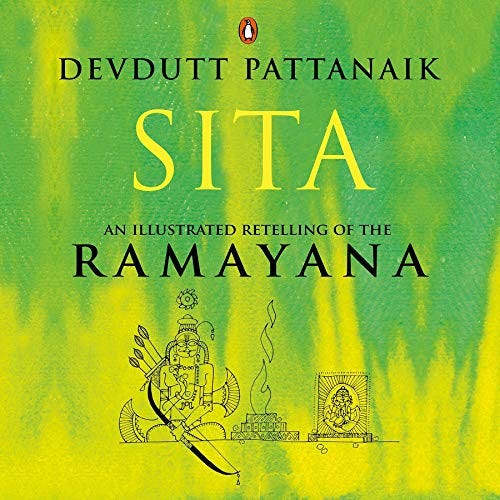Sita: An Illustrated Retelling of Ramayana by Devdutt Pattanaik
Genre: Mythology
Rating: 2 stars
“Animals compete for mates and fight over territory. Humans do not have to. Rules ensure this. Animals do not eat more than they have to. But humans do. Rules prevent this.”
To be fair to the author, I started reading Devdutt Pattanaik’s Sita: An Illustrated Retelling of Ramayana right after I finished another mythological retelling: Circe by Madeline Miller. Some part of my disappointment while reading this book may have come from the high standards that Miller had set for stories about mythological women. But correct me if I am wrong; the book is named after Sita. So I wasn’t really wrong in going into it with expectations of reading an exploration of the Ramayana from the perspective of the woman at the forefront of it.
She is the one born from the earth, the one who witnesses the Upanishads as a young girl, the one who is kidnapped, the one who becomes the reason for a war of epic proportions, the one who has to prove her purity by walking through fire and the one who asks to be taken into the depths of the earth after spending years away from her husband due to gossip; and yet she plays second fiddle in a book literally named after her. As someone always on the lookout for different takes on mythological stories, I went into the book expecting something like Miller’s Circe or Chitra Banerjee Divakaruni’s Draupadi (The Palace of Illusions), and throughout the book, I was left searching for Sita’s own opinions or thoughts. He makes an attempt to keep Sita at the centre of the story by having Hanuman narrate to her all that has happened while she is trapped in Lanka, but even that feels half-hearted. The book has a line that I found very apt given the story of Ramayana: “Those who trust need no proof; those who do not trust reject all proof.”
In all, it was just another retelling of a story I already knew. It didn’t bring anything new to the table in terms of narrative. However, the illustrations do add a quirky touch. Coming to the grey boxes at the end of each chapter, they didn’t annoy me as much as they did when I read Pattanaik’s Shikhandi: And Other Tales They Don’t Tell You. It did give a lot of extra information in terms of all the different versions of the story that exist in the country, which I found interesting. Having said that, towards the beginning of the book, some of the comments in the boxes made by Pattanaik made me grit my teeth, and I had to force myself to continue. However, the book did have a few lines that I thought were well put.
“Knowledge is like a floating log of wood that helps us stay afloat in the ocean of misery. To find the shore, we have to kick our legs and swim. No one can do that for us.”



